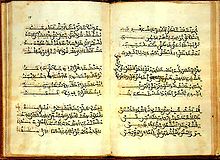
Back Literatura alchamiada AN عجمية (الأندلس) Arabic Aljamía AST Alhamijado književnost BS Aljamia Catalan Aljamiado German Aljamiado Esperanto Aljamía Spanish Aljamia EXT آلخامیادو Persian
You can help expand this article with text translated from the corresponding article in Spanish. (August 2022) Click [show] for important translation instructions.
|



Aljamiado (Spanish: [alxaˈmjaðo]; Portuguese: [alʒɐmiˈaðu]; Arabic: عَجَمِيَة trans. ʿajamiyah [ʕaʒaˈmij.ja]) or Aljamía texts are manuscripts that use the Arabic script for transcribing European languages, especially Romance languages such as Old Spanish or Aragonese. This alphabet is also called the Morisco alphabet.
According to Anwar G. Chejne, Aljamiado or Aljamía is "a corruption of the Arabic word ʿajamiyah (in this case it means foreign language) and, generally, the Arabic expression ʿajam and its derivative ʿajamiyah are applicable to peoples whose ancestry is not of Arabian origin".[3] During the Arab conquest of Persia, the term became a pejorative.[4]
- ^ Martínez-de-Castilla-Muñoz, Nuria (2014-12-30). "The Copyists and their Texts. The Morisco Translations of the Qur'ān in the Tomás Navarro Tomás Library (CSIC, Madrid)". Al-Qanṭara. 35 (2): 493–525. doi:10.3989/alqantara.2014.017. ISSN 1988-2955.
- ^ The passage is an invitation directed to the Spanish Moriscos or Crypto-Muslims so that they continue fulfilling the Islamic prescriptions in spite of the legal prohibitions and so that they disguise and they are protected showing public adhesion the Christian faith.
- ^ Chejne, A.G. (1993): Historia de España musulmana. Editorial Cátedra. Madrid, Spain. Published originally as: Chejne, A.G. (1974): Muslim Spain: Its History and Culture. University of Minnesota Press. Minneapolis, USA
- ^ Frye, Richard Nelson; Zarrinkoub, Abdolhosein (1975). "Section on The Arab Conquest of Iran". Cambridge History of Iran. 4. London: 46.
© MMXXIII Rich X Search. We shall prevail. All rights reserved. Rich X Search